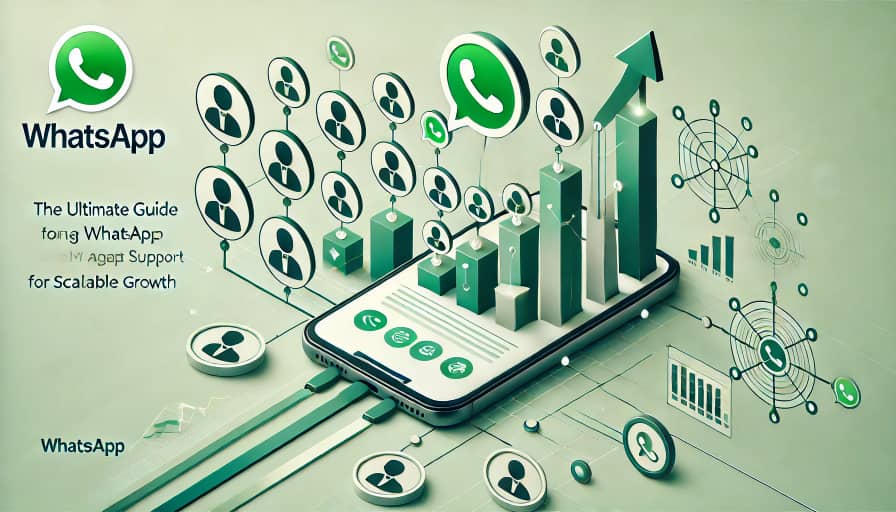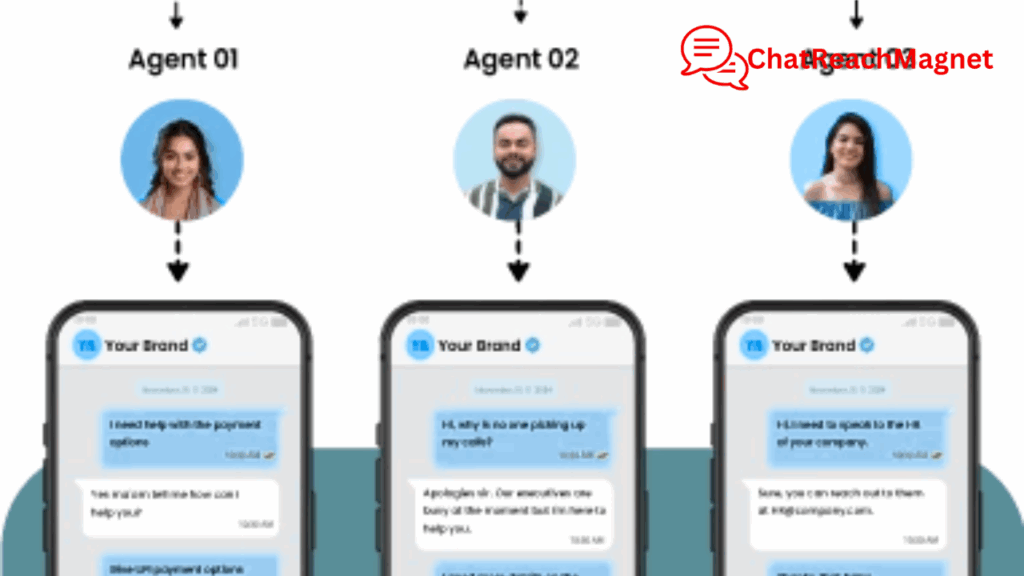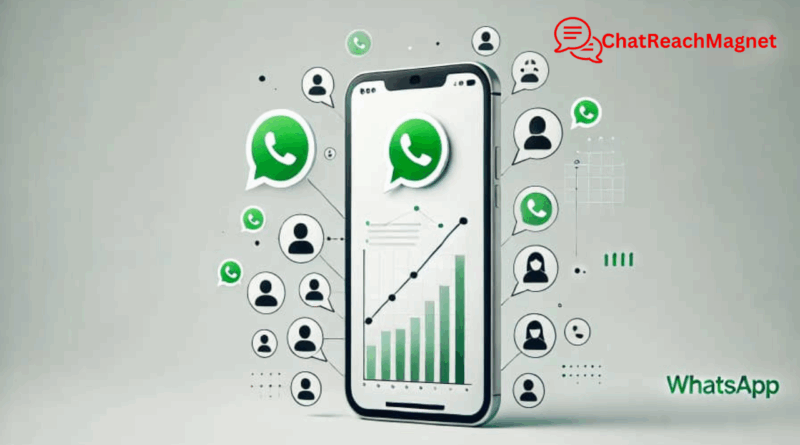Guide to Using WhatsApp Multi-Agent Support for Scalable Growth
WhatsApp Multi-Agent Support is revolutionising how businesses communicate at scale.
Whether you’re a growing eCommerce store, a digital service provider, or a customer-focused enterprise, managing high volumes of WhatsApp messages across multiple agents is no longer a challenge. It’s now a strategic advantage.
In this ultimate guide, we’ll explore what WhatsApp multi-agent support is, why it matters for business scalability, how it works, the best tools to use, and how to set it up for long-term growth and customer satisfaction.
What is WhatsApp Multi-Agent Support?

WhatsApp Multi-Agent Support refers to the ability for multiple customer service agents or team members to respond to WhatsApp messages from a single business account. This setup is essential for handling large-scale customer interactions efficiently—without missing messages, causing delays, or compromising the quality of service.
This feature is made possible through WhatsApp Business API or third-party tools that connect multiple users to one WhatsApp number in a shared inbox.
Why You Need Multi-Agent Support for Growth
As your business scales, so does the volume of customer queries. Handling all those messages on a single mobile device is simply not feasible.
Here’s why multi-agent support is crucial:
#1. Improved Response Times
With multiple agents active, you can respond to customer enquiries faster—boosting satisfaction and trust.
#2. 24/7 Availability
Assign shifts to your agents to cover different time zones or provide after-hours support, ensuring continuous service.
#3. Efficient Workload Distribution
Assign chats based on agent expertise or departments (sales, support, delivery), reducing pressure on any single individual.
#4. Centralised Customer Data
When using CRM-integrated tools, all customer interactions and chat histories are stored and accessible in one place—streamlining follow-ups.
#5. Scalability
As your customer base grows, you can add more agents without changing your WhatsApp number or losing conversation continuity.
Key Features of WhatsApp Multi-Agent Platforms

When choosing a platform for multi-agent WhatsApp support, look for these must-have features:
#1. Shared Inbox
A unified interface where all agents can view, manage, and reply to customer chats collaboratively.
#2. Agent Assignment
Auto-assign or manually allocate chats to the right team member based on rules or agent availability.
#3. Internal Notes & Tagging
Agents can leave internal comments, mark conversations by status (pending, resolved), or use tags to categorise leads.
#4. Chat Analytics
Monitor team performance with data on response time, resolution rate, message volume, and customer satisfaction scores.
#5.Chatbots & Automation
Use bots to handle FAQs or greet users before a human agent takes over—ideal for high-volume periods.
#6. CRM & eCommerce Integration
Seamless sync with tools like HubSpot, Shopify, WooCommerce, or Salesforce for personalised communication.
Top Platforms That Offer WhatsApp Multi-Agent Support
Here are some of the leading platforms that support WhatsApp multi-agent communication:
#1. Chatreachmagnet
- Built on WhatsApp Business API.
- Offers shared inbox, automation, and team performance tracking.
- Great for SMEs and eCommerce.
- Built on WhatsApp Business API.
- Offers shared inbox, automation, and team performance tracking.
- Great for SMEs and eCommerce.
#3. Zoko
- Enables sales, support, and marketing teams to use the same WhatsApp number.
- Deep Shopify integration.
- Tagging, assignment, and analytics features included.
#4. Twilio
- Developer-friendly.
- Offers API-based infrastructure for large businesses.
- Ideal for building custom multi-agent solutions.
#5. Respond.io
- User-friendly UI with rich automation workflows.
- Allows integration with multiple messaging platforms beyond WhatsApp.
#6. Freshchat (by Freshworks)
- Conversational support platform.
- Offers bot-to-human handover, agent routing, and multichannel support.
How to Set Up WhatsApp Multi-Agent Support (Step-by-Step)

Step 1: Get WhatsApp Business API Access
You cannot use multi-agent support with the regular WhatsApp Business App. You need to apply for WhatsApp Business API access through a provider like Chatreachmagnet, Twilio, WATI, or 360dialog.
Step 2: Choose a Multi-Agent Platform
Select a third-party tool that fits your budget, industry needs, and preferred integrations.
Step 3: Connect Your WhatsApp Business Number
Once your number is approved and connected to the API, link it to your chosen platform.
Step 4: Add Team Members
Invite your agents or departments to the dashboard. Set roles, permissions, and responsibilities.
Step 5: Configure Auto-Routing and Bots
Set up intelligent routing rules to assign conversations automatically. You can also install a welcome bot to handle FAQs.
Step 6: Train Your Team
Provide guidelines on tone, response time, escalation protocols, and how to use the shared tools.
Step 7: Monitor and Optimise
Use analytics to track response rates, agent productivity, and conversation outcomes. Continuously refine processes to improve.
Use Cases for WhatsApp Multi-Agent Support
🛒 eCommerce Stores
Support during order placement, delivery tracking, return/refund queries, and promotions.
🧾 Financial Services
Respond to loan enquiries, send documents securely, and assist with account issues.
🏥 Healthcare
Schedule appointments, send reminders, and offer virtual consultations across departments.
✈️ Travel & Hospitality
Handle booking confirmations, cancellations, itinerary changes, and customer support during travel.
🎓 Educational Institutions
Engage with students and parents on admission queries, course updates, and live support during virtual sessions.
Best Practices for Managing a Multi-Agent WhatsApp Team
- Define SOPs (Standard Operating Procedures) for messaging tone, escalation, and closing chats.
- Label and tag conversations for organised data management.
- Use templates for common replies to ensure speed and consistency.
- Set SLAs (Service Level Agreements) to maintain high responsiveness.
- Monitor agent workloads to avoid burnout and ensure fairness.
- Review analytics weekly to spot and fix gaps in service.
Common Challenges and How to Overcome Them
| Challenge | Solution |
| Message Overload | Set up chatbot filters and routing rules |
| Inconsistent Replies | Use templated responses and team training |
| Lack of Coordination | Utilise internal notes and agent tagging |
| Limited Visibility | Use dashboards and real-time reporting |
| Customer Privacy | Ensure GDPR/NDPR compliance with secure tools |
Conclusion
If you’re serious about scaling your business, enhancing your customer service, and turning WhatsApp into a growth engine, multi-agent support is no longer optional—it’s essential. It allows you to operate efficiently, provide round-the-clock assistance, and convert every chat into an opportunity.
Whether you’re a growing startup or an enterprise, this setup ensures your business stays responsive, professional, and ready to thrive in today’s real-time digital economy.

